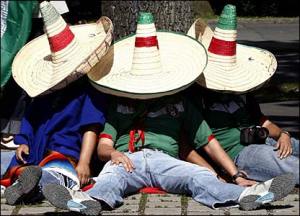If we can’t sleep, perhaps it’s because we’ve forgotten how. In premodern times people slept differently, going to bed at sunset and rising with the dawn. In winter months, with so long to rest, our ancestors may have broken sleep up into chunks. In developing countries people still often sleep this way. They bed down in groups and get up from time to time during the night. Some sleep outside, where it is cooler and the effect of sunlight on our circadian rhythm is more direct. In 2002, Carol Worthman and Melissa Melby of Emory University published a comparative survey of how people sleep in a variety of cultures. They found that among foraging groups such as the Kung and Efe, “the boundaries of sleep and waking are very fluid.” There is no fixed bedtime, and no one tells anyone else to go to sleep. Sleepers get up when a conversation or musical performance intrudes on their rest and intrigues them. They might join in, then nod off again.
 Now consider the siesta. The timing of the traditional siesta corresponds to a natural post-lunch dip in our circadian rhythms, and studies have shown that people who catnap are generally more productive and may even enjoy lower risk of death from heart disease. It is the Spanish who have made the siesta famous. Unfortunately, Spaniards no longer live close enough to work to go home and nap. Instead some use the afternoon break to go out for long lunches with friends and colleagues. Having spent two hours at lunch, Spanish workers then cannot finish work until seven or eight. But even then they don’t always go home. They go out for drinks or dinner instead. (Go to a Spanish disco at midnight and you’re likely to be dancing alone; their prime-time TV shows are just ending.)
Now consider the siesta. The timing of the traditional siesta corresponds to a natural post-lunch dip in our circadian rhythms, and studies have shown that people who catnap are generally more productive and may even enjoy lower risk of death from heart disease. It is the Spanish who have made the siesta famous. Unfortunately, Spaniards no longer live close enough to work to go home and nap. Instead some use the afternoon break to go out for long lunches with friends and colleagues. Having spent two hours at lunch, Spanish workers then cannot finish work until seven or eight. But even then they don’t always go home. They go out for drinks or dinner instead. (Go to a Spanish disco at midnight and you’re likely to be dancing alone; their prime-time TV shows are just ending.)
Lately the Spanish have begun to take the problem of sleep deprivation seriously. The police now question drivers in serious accidents about how long they slept the night before, and the government has recently mandated shorter hours for its employees to try to get them home earlier.
What has motivated the Spanish to take action against sleepiness is not so much their accident rate—historically among the highest in western Europe—as their flat productivity. The Spanish spend more time at work and their productivity is less than most of their European neighbors.
